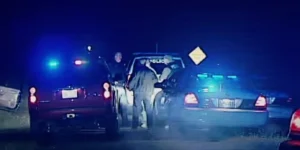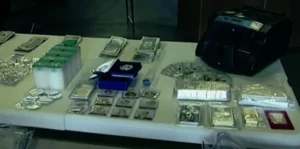Note: we are republishing this story, which originally made the news in October 2016.
A Massachusetts couple has lost over $100,000 after a federal judge ruled in favor of the government’s request to keep the cash discovered in their vehicle during a traffic stop. Four years ago, Adam and Jennifer Perry of Ashburnham were pulled over by a state trooper for speeding in northwest Illinois.
The couple told the trooper that they were heading to Salt Lake City to see a hearing specialist based in Utah.
 Photo Credit: Blaze TV
Photo Credit: Blaze TV
The Illinois State Trooper suspected that there were drugs in the car, and with the assistance of the K-9 unit, searched the Toyota Tundra. State police found a suitcase with money bagged in plastic and hidden in the lining, a black duffel bag reeking of marijuana and a second duffle bag “filled with large vacuum sealer bags, permanent markers, masking tape and desiccant packets,” court documents stated.
There were no drugs found in the car. In the center console under the armrest, police recovered a black collapsible baton. A loaded Smith and Wesson pistol with a live round in the chamber was recovered from a removable plastic panel of the vehicle. Adam accused officers of “planting” the pistol in his truck, court documents show.
 Photo Credit: Blaze TV
Photo Credit: Blaze TV
The money in the suitcase amounted to $102,000, with another $5,520 found in Jennifer’s wallet, which was also seized.
The two were taken to state police barracks for questioning following the search. They were never charged but their truck and money were seized.
A federal judge has granted the government’s request to permanently hold on to the money.
According to Judge Sara Darrow of the U.S. District Court for the Central District of Illinois, the couple failed to reveal where the funds came from.
 Photo Credit: Blaze TV
Photo Credit: Blaze TV
The couple, who acted as their own attorneys in the forfeiture case, argued that they should receive the benefit of the doubt. In a letter, Adam wrote: “You should be treating me innocent until proven guilty and not denying me my right to counsel,” and proceeded to list several ways he’d received money: two settlements, one from an insurance policy, the other from a former employer; proof of employment in a position that paid more than $20 an hour and the sale of more than one vehicle.
U.S. Attorney for the Central District of Illinois James A. Lewis argued that the cash needed to be awarded to the government “because it is property which constitute proceeds traceable to the exchange of controlled substances.”
Sources: Masslive